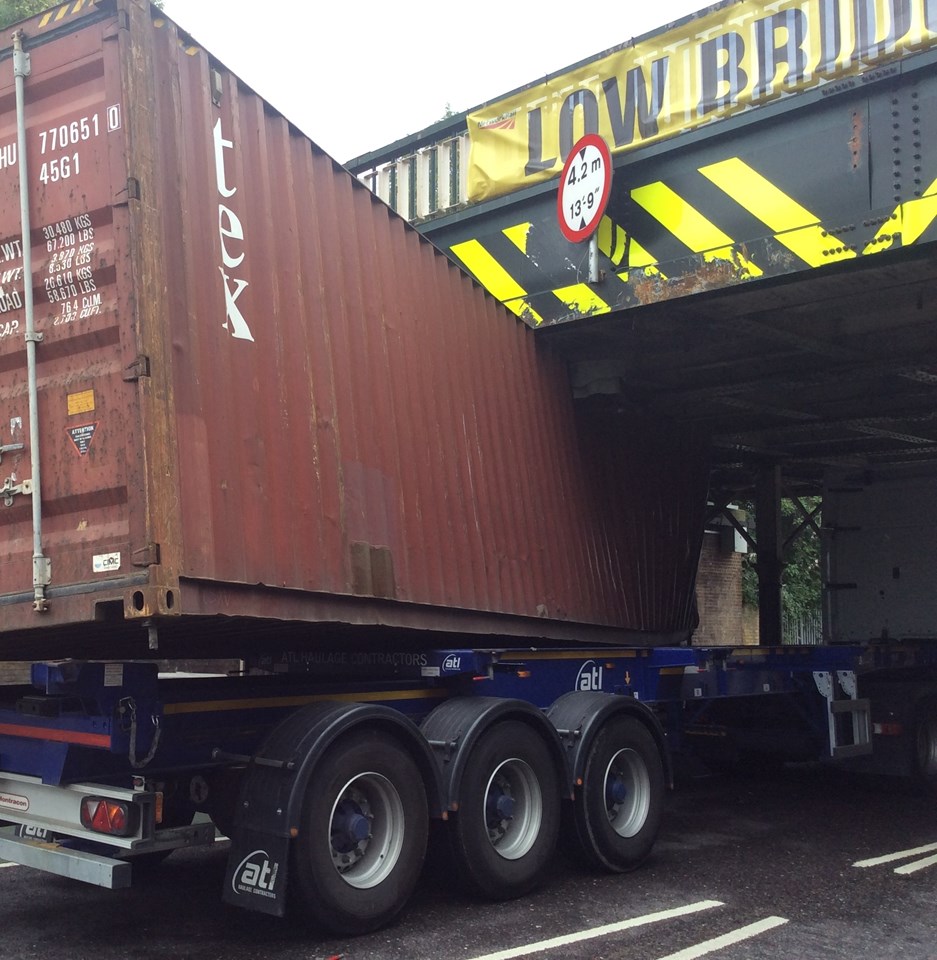Friday 4 Mar 2016
Network Rail and train operators in the South East appeal to truck drivers after lorries hit three bridges in 12 hours
- Region & Route:
- | Southern
Passengers in the South East suffered delays yesterday evening and this morning (Thursday and Friday) after three bridges were hit by high vehicles within 12 hours of each other.
Network Rail is appealing to drivers of heavy goods vehicles to take more care around low bridges as delays mount up.
First, a bridge over the South Circular in Tulse Hill was hit on Thursday night, leading to delays to Thameslink passengers. Then on Friday morning, Grosvenor Road Bridge near Victoria was hit by a heavy goods vehicle, leading to delays to Southern and Gatwick Express passengers, and a bridge near Orpington station was struck, bringing delays to Southeastern passengers.
Network Rail’s route managing director, Alasdair Coates, said: “We work closely with highways authorities to make sure our low bridges have good signage and drivers are aware when they may be in danger of hitting them.
“Despite that, we continue to see passengers delayed by high vehicles striking our bridges. With a railway network as busy and complex as ours in the South East, knock-on delays can spread very quickly and far from the site of the original incident.
“I urge hauliers and drivers to please be more careful.”
The situation is so serious at Tulse Hill that Network Rail has now assigned response staff to monitor the bridge on location at peak times every week. It has also installed a large steel protection beam, along with more signage - including a large banner - and also CCTV.
Dyan Crowther, Chief Operating Officer at Govia Thameslink Railway, said: “Lorries are hitting railway bridges with sickening regularity, causing disruption to thousands of passengers every time. The low bridge on the South Circular in Tulse Hill alone was hit by lorries four times in September and has since been struck twice every month, causing 147 cancellations and delaying trains by over 73 hours in total. For the sake of our passengers, this has to stop.”
Southeastern trains were delayed by a bridge strike in Orpington this morning (Friday) and they also suffer occasional delays from notable low bridges near Dover, Strood and in Chestfield, Kent.
A Southeastern spokesperson said: “When bridge strikes happen we have to delay and often cancel trains while repair work is taking place and throughout the day to allow delayed services to get back on track. This impacts our train crew who often find themselves displaced as a result, and unfairly causes major disruption to our passengers.”
Not all low railway bridges need the railway to be closed when they are hit and Network Rail grades the bridges according to their construction and their ability to withstand impacts. Some bridges are vulnerable to strikes and are protected with steel beams to reduce impact. These are also inspected by a qualified bridge inspector before trains are allowed to run at full speed over them.
For statistics and more on bridge strikes, go to http://www.networkrail.co.uk/aspx/3563.aspx
NOTES
Please note - as yet we have been unable to source quality pictures of today's incidents, so this is a library picture of Tulse Hill from last year.
Contact information
Passengers / community members
Network Rail national helpline
03457 11 41 41
Latest travel advice
Please visit National Rail Enquiries
Journalists
Network Rail press office - Chris Denham
Senior media relations manager
020 3357 7969
07515 626530
chris.denham@networkrail.co.uk
About Network Rail
We own, operate and develop Britain's railway infrastructure; that's 20,000 miles of track, 30,000 bridges, tunnels and viaducts and the thousands of signals, level crossings and stations. We run 20 of the UK's largest stations while all the others, over 2,500, are run by the country's train operating companies.
Usually, there are almost five million journeys made in the UK and over 600 freight trains run on the network. People depend on Britain's railway for their daily commute, to visit friends and loved ones and to get them home safe every day. Our role is to deliver a safe and reliable railway, so we carefully manage and deliver thousands of projects every year that form part of the multi-billion pound Railway Upgrade Plan, to grow and expand the nation's railway network to respond to the tremendous growth and demand the railway has experienced - a doubling of passenger journeys over the past 20 years.
Follow us on Twitter: @networkrail
Visit our online newsroom: www.networkrailmediacentre.co.uk

